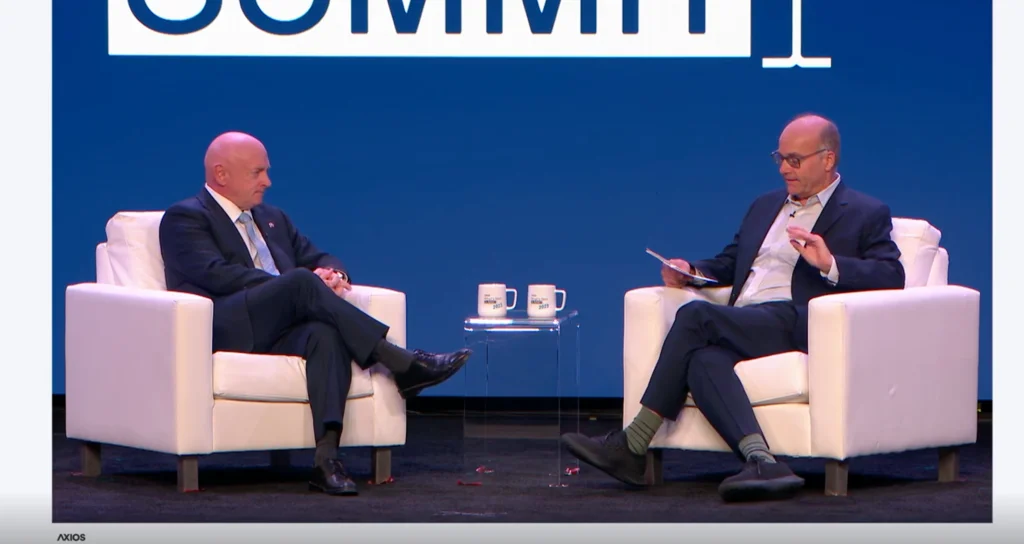WATCH: Sen. Kelly Talks TikTok, Space as the New High Ground, and Competition with China During Axios’ What’s Next Summit
Today, Arizona Senator Mark Kelly, a member of the Senate Armed Services Committee, spoke with Axios co-founder Mike Allen during Axios’ annual What’s Next Summit about his bipartisan work to boost U.S. competitiveness, innovation, and economic opportunities for Arizonans and Americans across the country.
During the conversation, Kelly, a former NASA astronaut and Navy combat veteran, shared his thoughts on the national security concerns over the Chinese-owned TikTok app, discussed his leadership to usher the CHIPS and Science Act into law as well as its economic impact on Arizona, talked about his views on space as the next military high ground, and how soon he thinks a human will step foot on Mars.
Click HERE to watch the conversation. See key excerpts below:

On national security concerns over the Chinese-owned TiKTok app:
We are concerned that this platform has not a lot of safeguards with regards to our own national security. First of all, the Chinese government on-demand can get access to the data of millions of Americans just by asking.
On top of that, we also have the issue that they could very quickly communicate–if they chose to do this–with millions of Americans and try to potentially change a narrative. That is a national security [issue] for us. What we want to do, and CFIUS even said that, this should be sold to a U.S. company. So that’s what we would like to see.
[…] There are some things that we can do to still allow this capability for U.S. businesses and individuals to use as social media and at the same time protect the national security of the United States. One obvious thing is a big chunk of this company is owned by a Chinese company that is very close to the Chinese government. That can change.
On space becoming the new ‘high ground’ and competition with China:
I am concerned about it. China has a space station in orbit. They are putting a lot more satellites– ISR satellites which are intelligence surveillance reconnaissance platforms in low-Earth orbit. They have got a lot of them.
Space is becoming the high ground. In a military operation, even if you go back to the Revolutionary War, maintaining the high ground in combat operations is a significant thing. I would say, now, the high ground could be considered space and having that ISR capability. We also use it for other things. We have got to make sure we are more capable than the Chinese. If we don’t, that’s a national security risk for us. […]
On how soon a human can step foot on Mars:
I think it’s pretty likely. I am still hopeful that I will see somebody walk on Mars. I think we can do it in, you know, 20 years is not out of the question. A lot depends on the U.S. government, what we decide to focus on, how the Artemis missions to the moon go.
[…] As we go forward here, my expectation is that when we go to Mars someday that we will do this as an international collaboration.
On the significance of Kelly’s CHIPS law on U.S. innovation, national security:
We invented the semiconductor chip in this country. We used to make the best chips. We used to, not too long ago, make about 40 percent of the supply of semiconductor chips in the world. That is now down to 12 percent, and it had been going in the wrong direction. This also is a national security issue for us because the best semiconductor chips in the world come from across the Pacific Ocean, mostly. Taiwan and South Korea. […]
If we lose access to those chips, in a matter of a couple of years, we could lose a significant portion of our GDP. We also need these chips to defend ourselves. So this became an untenable situation. We had to fix it. So I was one of the authors of this legislation, the CHIPS and Science Act, that is providing $52 billion–$39 billion of it is in incentives, but there is also education, research and development, and building a network to design the next generation of chips.
On how Kelly’s CHIPS law fuels economic growth, boosts U.S. competition with China:
[…] It means tens of thousands of high-paying jobs– jobs that you can actually raise a family on that do not require a four-year degree. We need more of that. And it’s not just chips. We’ve got other issues where manufacturing is moved to China, to other countries, that we will have an opportunity to bring back. Higher fuel costs, if we are buying stuff from across the ocean, it raises the prices, rising wages in other countries, it is starting to become more competitive to manufacture certain things here.
It’s a big deal for Arizona…This is just going to help us grow and bring other companies to the state of Arizona. The suppliers for the chip manufacturers like TSMC and Intel that are expanding their facilities. […]
